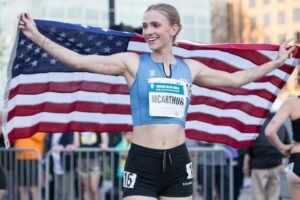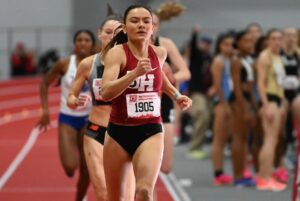By Alison Wade
In December, the U.S. Center for SafeSport ruled that former Wellesley College and Olympic coach John Babington had been banned from coaching. And on Friday, two of the athletes he sexually abused when they were teenagers, Olympic 10,000m bronze medalist Lynn Jennings and former world junior record holder Darlene Beckford Pearson, came forward to tell their stories in a Boston Globe article, written by Bob Hohler. They were joined by Melody Fairchild, who says she escaped Babington’s advances, and an anonymous Wellesley College student, who left the school after unwanted sexual contact with Babington.
It’s coincidental yet fitting that after Jennings’ years-long pursuit of justice, the story broke the weekend of the World Cross Country Championships. Jennings, 62, is also a three-time World Cross Country champion. I was a junior in high school in 1992, when my father took me to watch her win her third consecutive title in a sprint finish on a snowy course in Boston. She was the runner so many of us looked up to at the time, and she was as tough as they come.
Those newer to the sport might not recognize Jennings’ name, because when she retired from competitive running, she mostly chose to leave the public eye. But before there was Deena Kastor or Shalane Flanagan, there was Lynn Jennings.
I met Babington, her longtime coach, in 2008, when we happened to be part of the same trip to Kenya. And late in the summer of 2012, I took a pay cut from my already poorly paying coaching job to become his assistant coach at Wellesley College. Babington knew he would be retiring before too long, and he wanted me to replace him. (Instead, that ended up being the end of my college coaching career, too.)
I coached with Babington, now 77, for only nine months, but during that time, I thought I got to know him pretty well. I enjoyed many aspects of my time at Wellesley, a women’s college 14 miles west of Boston. I wrote recruiting letters that played up Babington’s elite coaching accomplishments. I enjoyed talking to him about the sport. I was quoted saying nice things about him in articles about his retirement. We remained in touch intermittently after he retired. He was very supportive of my career. I was completely in the dark.
I think it was in 2019 that SafeSport reached out to me, saying they wanted to talk to me about someone I had coached with. Babington wasn’t the first or second person who came to mind. And that’s one of the more discouraging things about my college coaching experience. I still don’t know if sexual abuse in coaching is really that prevalent, or if I just had some rough luck in crossing paths with several coaches who preyed on young athletes.
I told SafeSport about my experience with him. There were some eyebrow-raising things (I’m being vague to protect students), but I wasn’t aware of anything that would trigger a SafeSport investigation. If I was, I would have spoken up long ago. The truth was still so far off my radar at that point that I thought the investigation might be a mistake.
It wasn’t until March 2021 that I got a call that led to me learning everything in Friday’s Globe article. I processed the news by going for an early morning rage run on Wellesley’s campus—still closed to the public at the time due to the pandemic—prepared to give anyone who tried to stop me an earful.
For a while, I saw a therapist to help me process this case. There are aspects of it that I’ll never be able to discuss publicly. Nearly two years later, I’m still shocked, devastated, and processing it all. I’m furious at how Wellesley mishandled Babington’s assault of a student. I’m awed by the determination Jennings showed in bringing this story to light, and the bravery it took for each woman to tell her story. And I’m heartbroken for everyone who has been affected by Babington’s crimes. As Pearson said, “It changes a person.”
The most remarkable detail of the story is the way it opens, with what feels like a moment of divine intervention. When the USOPC called the Cambridge, Massachusetts, police department in 2019 to report that Jennings had alleged that Babington had sexually abused her when she was a teenager, the officer who happened to take the call was Pearson, Jennings’ former Liberty Athletic Club teammate, who had also been sexually abused by Babington. Until then, Pearson thought she was alone.
I don’t fault Wellesley officials for not knowing about what happened to Jennings or Pearson, but I do fault them for giving Babington only a slap on the wrist after they learned that he had brought a Wellesley athlete to his apartment, given her alcohol, and had sexual contact with her. She was so traumatized by the experience that she left the school.
But Babington did not. Wellesley placed him on unpaid leave during the 1998 cross country season and required him to see a therapist. But then he was allowed to resume his role with the team. It seems that very few people ever knew the reason behind his unpaid leave. Team members were told that he was taking a sabbatical, and that was the story he maintained years later. Even Laura Woeller Hill (Laura Baker at the time), one of the coaches who replaced him that season, says she had no idea.
Yes, it was a different time, but having been a college student around that time, I know that if my coach was caught doing something like that, I would have expected him to be booted from the profession for life. But even now, when coaches get fired, they are often allowed to go quietly, which allows them to get jobs elsewhere. (I think about the case of former Northeastern coach Steve Waithe, who was fired in 2019 for “inappropriate conduct toward female student athletes” but was hired to coach at Concordia University Chicago seven months later.)
By the time I got to Wellesley, in August 2012, I don’t know who in the athletic department, aside from Babington, knew about what happened in the late 1990s. There was a new athletic director and a new college president. Perhaps they were unaware, but if so, why was that knowledge not passed along? The things I mentioned to the SafeSport investigator that raised eyebrows should have put anyone who knew what had happened in the past on higher alert. Instead, a man who should have gone to prison in the 1970s was given another chance to coach at a women’s college.
I’ve been seeing people commenting that they could tell Babington was a predator just from looking at him, or from one interaction. I wish it was that easy. These things don’t go mostly undetected for 46 years if someone is terrible to everyone. I watched some people have very positive experiences with Babington and receive great coaching. That’s why I understand the conflicted feelings some Wellesley alumnae I’ve heard from are having, as they reconcile what they experienced with what they read in the Globe article, even if there’s no doubt in anyone’s mind who is right and who is wrong here. Babington never should have been able to coach at Wellesley in the first place.
To cast him as an obvious monster is dangerous, because it misplaces blame on everyone in his orbit, including the survivors, for not being able to tell. Criminals go undetected among us all the time, and part of what makes them dangerous is their ability to blend in and earn our trust.
Though I am grateful that SafeSport exists, following this process has also highlighted for me the organization’s many shortcomings. When I learned the truth about this case in 2021, I was under the impression that the investigation was wrapping up and we’d have a verdict soon. It’s quite the experience spending 22 months thinking a decision might be coming any day; I can only imagine what that was like for the claimants. There were times that I wondered if this case would ever be resolved. And I still wonder where this might have fallen on the priority list if there weren’t high-profile athletes involved.
The process was an ultramarathon for Jennings, who began her pursuit to bring this case to light in 2017. It’s notable that her first step was to contact the Globe, but that went nowhere because “her account lacked corroborating evidence,” and she wasn’t willing to be identified at that point. SafeSport didn’t exist until 2017, and Jennings didn’t learn about it until 2019.
Babington’s ban is largely symbolic, because it came nine years after he had already retired from coaching. But what it has done is give the survivors the opportunity to speak out and be believed. The investigation has given Jennings the corroborating evidence she needed. I have wondered where this case would be if Babington hadn’t admitted to his crimes, which I’m told is rare.
And if Babington had just been a collegiate coach, and had never coached athletes at USA Track & Field or Olympic events, this case wouldn’t have been within SafeSport’s jurisdiction, because they don’t cover the NCAA. I’m glad SafeSport exists, and I’ve seen it make a difference in this case, but athletes need more avenues to seek justice. The center has been swamped since it opened, and the cases they are handling take too long to resolve.
In 2019, New York State passed the Child Victims Act, which temporarily lifted the statute of limitations for survivors of child sexual abuse. More states need such laws. There are so many reasons why survivors aren’t equipped to come forward when they are young. Even if they had been ready and had the language to speak about their experiences, who would have believed Jennings and Pearson in the 1970s or ’80s?
And Jennings knew she had a future in running. She feared that if she came forward, her parents would have pulled her out of the sport she loved. So instead she became a “whiz at compartmentalizing,” living a secret double life so that the truth wouldn’t get out. And as time passed, her running goals became bigger. She got even better at shutting out anything that could get in the way of her success. It’s incredible what she was able to accomplish during her career in spite of it all and heartbreaking that she suffered so much along the way.
And I was disgusted to read in the Globe that it would have been tough to prosecute Babington for sexually abusing Pearson because she was 16 when it happened and that is the age of consent in Massachusetts. I don’t know enough about the law here, but that certainly sounds like something that needs to change. Because, as Hohler wrote, “There was nothing ambiguous about what Pearson endured.”
Wellesley president Paula A. Johnson, who took over in 2016, sent a statement out to the college community on Friday, after the article was published, and it sounded more heartfelt than the generic statement included in the Globe. Johnson wrote that the college isn’t aware of any other allegations of sexual misconduct against Babington during his 26 years at the school, but if anyone has additional information, they should reach out to the school’s Title IX coordinator. I don’t trust a school that has already covered up sexual assault to investigate itself. They need to hire an independent investigator. And I hope that the college will find ways to support those affected by this.
I’ve long admired Jennings for her running accomplishments, but now I admire her, and the other survivors, for their courage as well. Hohler wrote that Jennings has pursued this case with “an Olympian’s tenacity,” and that’s the perfect way to describe it.
Jennings was inspired to speak out after reading long-distance swimmer Diana Nyad’s story of sexual abuse by a coach when she was young. (New York Times link, and the article contains graphic descriptions of sexual assault.) And I hope this story will inspire many others to share their experiences and seek justice. Nyad’s story ends with the line, “Tell your story. Let us never again be silenced.”
Jennings has been famously private since she retired from elite running. But with this story, she has stepped back into the spotlight, if only for a moment, to help others. She owed no one the truth, but this feels like one more gift she’s giving to the running (and larger) community. Jennings chose to speak out partially because she was concerned that her silence would put others in danger. And while the damage Babington inflicted can’t be undone, in sharing her story, some of the weight has been lifted.





